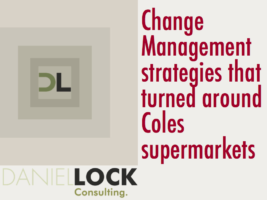Ian McLeod, until recently the Managing Director of Coles and now Group Commercial Director at Wesfarmers (the parent company of Coles), is a master of change management and a clear change leader.
Perhaps this is why he is continually tipped for a high profile return to the UK, on the list for the top job at major supermarket chain Morrisons.
Having been a director at Asda and the boss of Halfords, McLeod was employed by Coles in 2008 to change its fortunes. Under his leadership, Coles has doubled its profits and outperformed competitors for more than four years. Here I look at the Coles which McLeod took over, and the change management strategies he employed in its success story.
A basket of old fruits needing a change leader
The first day that McLeod walked into Coles’ Hawthorn East headquarters, he came face-to-face with a wheelbarrow packed with old fruits; mouldy, stale smelling, and ready for the skip. It turned out to be an almost perfect metaphor for the Coles Group as it was then. He immediately set about discovering the problems that lay behind the market’s perception of Coles as a crackpot case.
Getting out into the field as a change management strategy
One of McLeod’s first initiatives was to visit the coalface. Unlike his predecessor John Fletcher, who, when appointed, was quick to state he hadn’t been into a supermarket for two decades, McLeod made it part of his weekly routine to turn up at stores unannounced. He wanted to see what his customers saw day in, day out.
What he found was a supermarket chain which hadn’t changed for 30 years. The stores had the same layout as when they had first opened, were suffering from a style locked into the 1970s, and were cold, inhospitable places which lacked a customer experience. Its employees were like the stores they worked in: tired, worn-out, and demoralized.
The solution was to undertake a complete overhaul of the entire chain. Stores are now more open, inviting, and modern. Layouts now embrace the newest retail thinking, with customers encouraged to ‘flow around’ the store. Customers now spend longer in stores and spend more.
Suppliers are stakeholders of change, too
McLeod also visited the group’s suppliers and became the first boss of Coles to be seen in Coca-Cola’s head office for 40 years. He explained what he was trying to do at Coles, and how the retailer/supplier alliance would benefit all. Coles has benefitted from strengthening supply chain management and reduced prices, enabling price reductions to be passed to customers.
In 2008, the year that McLeod took the reins at Coles, the chain was ranked at 14th place (out of 15) by suppliers. Now it is ranked in the top four.
Be innovative in the new era
McLeod also realized that Coles was lagging in its customer offering. The supermarket became a winning formula because it gave consumers a ‘one-stop-shop’ for all their weekly shopping needs. In the modern world, consumers demanded more. Consequently, McLeod instigated a range of innovative initiatives as part of the overall change management strategy. These included trialing of sushi bars, coffee shops with coffee made by trained baristas, and ovens for baking fresh pizzas. The group has also expanded its website offering, with an order and collection service now in place.
Market to target customers to modernize
There are plenty of marketing opportunity for organizations in a world which are becoming smaller by the day. Before McLeod arrived, Coles’ marketing strategies were archaic, and the company was being outflanked by bigger budgets and more targeted messaging. Now it mines customer data, enabling marketing campaigns to be targeted at specific demographics. It uses a combination of direct SMS marketing, email, television and traditional print advertising to get its message out. It has even sponsored the hit television show, MasterChef.
Stay aware of your market when managing change
McLeod lives, breathes, eats, and sleeps retail. So much so that when traveling he visits supermarkets and retail outlets to discover what is working elsewhere. On a trip to his homeland of Scotland, he was ejected from a supermarket for taking photos of shelves, produce, and store layout. Management thought he was working on behalf of a local competitor, and wouldn’t believe he was the boss of a supermarket chain on the other side of the world.
McLeod joins the world’s top change management leaders
Under McLeod’s leadership, Coles has gone from donkey to thoroughbred racehorse. Its stores are visited by 18 million people each week, an increase of more than 25% since 2008. Annual sales have increased by more than 20% in this time, and profits have more than doubled.
These change strategies have been accompanied by greater emphasis on enhancing employee quality. Management communicates with their people. The staff is better trained, more highly motivated, and more customer conscious. Suppliers are better informed and work more closely with Coles’ management. For four years, Coles has seen growth quarter on quarter. Customers have benefitted from higher quality produce, a wider spectrum of products, better service, and more competitive prices.
As change leaders go, McLeod must surely rank with the likes of Jack Welch and Lou Gerstner.


